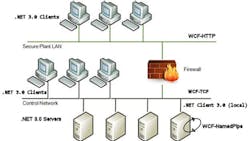OPC Foundation Releases OPC .NET 3.0 (WCF) to Bridge Microsoft .NET and OPC Classic
On October 25, the OPC Foundation released OPC .NET 3.0 (WCF), which was formerly known as OPC Express Interface (Xi). Developed as an enhancement to OPC Classic, OPC .NET 3.0 (WCF) serves to bridge the gap between Microsoft .NET and the world of OPC Classic and will also provide a common interface between newly developed .NET clients and OPC Classic servers.
OPC Classic relies on the Microsoft Distributed Component Object Model (DCOM) to manage distributed communications. By using the newly created OPC .NET 3.0 (WCF), developers can work with the Windows Communication Foundation technology and eliminate the headaches associated with DCOM configuration. Managed code applications developed using the OPC .NET 3.0 (WCF) interface will be able to take advantage of the included COM interop layer to easily enable communications with OPC Classic servers that are typically developed as unmanaged code applications.
The use of WCF also provides an increased level of security through built-in authentication, authorization and data encryption. Additional security features have been built into the interface to enable secure authentication across HTTP or TCP.
The OPC .NET Version 3.0 (WCF) is the next generation of development toolkit for the legacy OPC Classic interfaces. Whereas Version 1.0 was the automation wrapper for Visual Basic 6 development, Version 2.0 was the .NET interface containing the necessary infrastructure to convert from managed code to COM/DCOM and vice-versa; Version 3.0 now replaces DCOM completely by using the current Microsoft communications technology WCF.
In the future the OPC Foundation will integrate the OPC .NET 3.0 (WCF) with OPC Unified Architecture (UA), such that client applications based on OPC .NET 3.0 will be able to access OPC UA servers.
OPC .NET 3.0 (WCF) enables:
• Easy access to OPC DA (Data Access), OPC HDA (Historical Data Access) and OPC A&E (Alarms and Events).
• A .NET development environment
• Secure, firewall-friendly communications via WCF
• A Microsoft-centric replacement for DCOM
• Full compatibility with OPC Classic
For more information, please visit http://www.opcfoundation.org/dotnet3.

